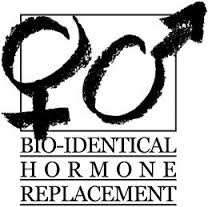Bioidentical hormone replacement therapy
Bioidentical hormone replacement therapy (BHRT) or natural hormone therapy uses hormones that are molecularly identical to edogenous hormones. These include estrone, stradiol and progesterone as well as testosterone, dehydroepiandrosterone and estriol.
The aim of such therapy is to replicate the natural levels of these hormones. Proponents of BHRT see it as a panacea for diseases, including Osteoporosis, instead of the mere relief of menopausal symptoms.
The use of progesterone , this therapy for the prevention and treatment of Osteopenia and
Osteoporosis has been suggested by John R. Lee M.D since the 1990's. His book has been a 'touchstone' for many women. If bioidentical hormone replacement therapy as a way of dealing with postmenopausal bone loss, interests you, I suggest that you get a copy and read the whole story before acting on any ideas you may have heard. The book is inexpensive and provides a clear picture of his ideas about bioidentical hormone replacement therapy.
Scientific studies Bioidentical hormone replacement therapy
What do the scientific studies say about this Bioidentical hormone replacement? There have been several studies published since 2007. Here is a summary of their findings:
- 2007. Journal General Internal Medicine. July 2007.
"Bioidentical Hormones for Menopausal Hormone Therapy: Variation on a
Theme Adriane Fugh-Berman, MDcorresponding author and Jenna Bythrow, MS
candidate. ABSTRACT: BACKGROUND.
Progesterone creams and natural or
bioidentical compounded estrogen preparations
are being promoted to consumers as safe alternatives to conventional
menopausal hormone therapy and as health-promoting tonics. No reliable
data support these claims.
- SAFETY
Natural hormones, including estradiol, estriol, estrone,
and progesterone, can be expected to have the same adverse event
profile as conventional menopausal hormone regimens.
- SALIVARY HORMONE TESTS. Salivary tests may be used to persuade asymptomatic consumers to use hormones (or symptomatic patients to use higher doses than those needed to mitigate symptoms), a practice that can be expected to result in adverse events.
But in 2009 there was an article published that reviewed all published studies and came to a very different conclusion, Postgrad Med. Jan. 2009 "The bioidentical hormone debate: are bioidentical hormones (estradiol, estriol, and progesterone) safer or more efficacious than commonly used synthetic versions in hormone replacement therapy?" by K Holtorf of Holtorf Medical Group, Inc., Torrance, CA 90505, USA.

ABSTRACT: BACKGROUND: The use of bioidentical hormones, including progesterone, estradiol, and estriol, in hormone replacement therapy (HRT) has sparked intense debate. Of special concern is their relative safety compared with traditional synthetic and animal-derived versions, such as conjugated equine estrogens (CEE), medroxyprogesterone acetate (MPA), and other synthetic progestins. Proponents for bioidentical hormones claim that they are safer than comparable synthetic and nonhuman versions of HRT. Yet according to the US Food and Drug Administration and The Endocrine Society, there is little or no evidence to support claims that bioidentical hormones are safer or more effective. OBJECTIVE: This paper aimed to evaluate the evidence comparing bioidentical hormones, including progesterone, estradiol, and estriol, with the commonly used nonbioidentical versions of HRT for clinical efficacy, physiologic actions on breast tissue, and risks for breast cancer and cardiovascular disease. METHODS: Published papers were identified from PubMed/MEDLINE, Google Scholar, and Cochrane databases, which included keywords associated with bioidentical hormones, synthetic hormones, and HRT. Papers that compared the effects of bioidentical and synthetic hormones, including clinical outcomes and in vitro results, were selected. RESULTS: Patients report greater satisfaction with HRTs that contain progesterone compared with those that contain a synthetic progestin. Bioidentical hormones have some distinctly different, potentially opposite, physiological effects compared with their synthetic counterparts, which have different chemical structures. Both physiological and clinical data have indicated that progesterone is associated with a diminished risk for breast cancer, compared with the increased risk associated with synthetic progestins. Estriol has some unique physiological effects, which differentiate it from estradiol, estrone, and CEE. Estriol would be expected to carry less risk for breast cancer, although no randomized controlled trials have been documented. Synthetic progestins have a variety of negative cardiovascular effects, which may be avoided with progesterone. CONCLUSION: Physiological data and clinical outcomes demonstrate that bioidentical hormones are associated with lower risks, including the risk of breast cancer and cardiovascular disease, and are more efficacious than their synthetic and animal-derived counterparts. Until evidence is found to the contrary, bioidentical hormones remain the preferred method of HRT. Further randomized controlled trials are needed to delineate these differences more clearly. END of abstract about Bioidentical hormone replacement hormone replacement therapy
NOTE: You can read more studies by clicking Bioidentical hormone replacement therapy or go to Natural Osteopenia treatments
If you have not checked ALL the possible causes of your bone loss, I urge you to do so. You will not overcome this problem until you have addressed ALL your Causes
